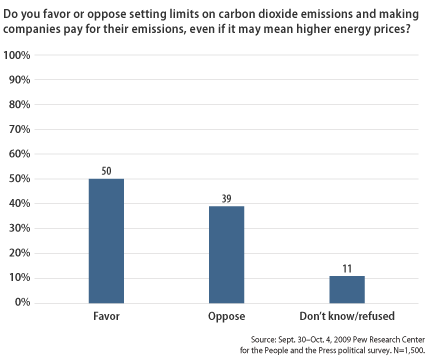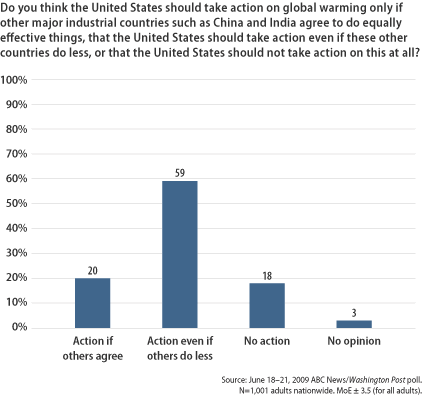“Six in 10 Americans support a cap and trade” proposal to cut pollution, according to a new national poll,” CNN reports (details at the end). The recent Pew Research poll also found strong support for climate action:

Of course, the Pew poll got a lot of attention for what it said about media miscoverage of the global cooling myth and the effectiveness of the disinformation campaign on climate science (see here). But the more important news is that like a half-dozen recent polls, it made clear the public supports action on climate and clean energy:
- Swing state poll finds 60% “would be more likely to vote for their senator if he or she supported the bill” and Independents support the bill 2-to-1
- Yet another major poll finds “broad support” for clean energy and climate bill: “Support for the plan among independents has increased slightly”
- Zogby: 71% of likely voters support House climate bill
- Public opinion snapshot: Public backs key elements of global warming bill
- Mark Mellman must read on climate messaging: “A strong public consensus has emerged on the reality and severity of global warming, as well as on the need for federal action” — ecoAmerica “could hardly be more wrong”
- Honey, I shrunk the GOP, Part 2: Opposing clean energy hurts GOP — Mellman
And that’s pretty impressive given that the fossil-fuel-funded opponents of action have in aggressively ramping up spending on their anti-action campaign to mislead the public about the low cost of action and the high cost of inaction.
A leading expert on public opinion analysis, Ruy Teixeira, Senior Fellow at the Center for American Progress, writes of the Pew poll:
Health care reform is occupying almost everyone’s attention these days, which is understandable given its level of importance and how close we are to big decisions in Congress. But other critical issues remain on Congress’s agenda and will be taken up once the health care situation is resolved. On the top of that list is climate change. Just-released data from the Pew Research Center suggests the public is ready to move forward in this area….
… the public gives 50-39 support to “setting limits on carbon dioxide emissions and making companies pay for their emissions, even if it may mean higher energy prices” (emphasis added).
These findings indicate that legislators should not rest on their laurels even if they succeed in passing health care reform. The public appetite for change is clearly broader than that.
The poll also finds the public believes the United States “should join other countries in setting standards to address global climate change” rather than “set its own standards to address global climate change.”
It’s a poorly worded question, but who can disagree with that choice? A better phrased WashPost polling question from June found almost three-fifths (59 percent) said the United States should take action on global warming even if other countries such as China and India are doing less to address the issue, compared to 38 percent who thought either we should take action only if these countries take equally aggressive action (20 percent) or we should do nothing (18 percent).

As should become clear to the public over the next few months, we are in the process of joining with other countries — and passing a domestic climate bill is the first step to making that happen.
UPDATE: CNN reports:
Sixty percent of those questioned in a CNN/Opinion Research Corporation survey say they favor ‘cap and trade,’ a Democratic sponsored plan in which the federal government would limit the amount of greenhouse gases that companies could produce in their factories or power plants. Thirty-seven percent oppose the proposal, which would penalize companies that exceed greenhouse gas limits with fines or by making those businesses pay money to other companies that producer smaller amounts of pollution.
The poll also suggests a partisan divide, with three in four Democrats backing the proposal and nearly six in 10 independents on board as well, but only four in 10 Republicans supporting “cap and trade.”
“The support of independents will be crucial to any cap and trade proposal,” Holland says. “Independents may not be red or blue, but they appear to be green. Earlier polls indicate that Independents believe in global warming and believe that the government can take steps to curtail the problem.”

